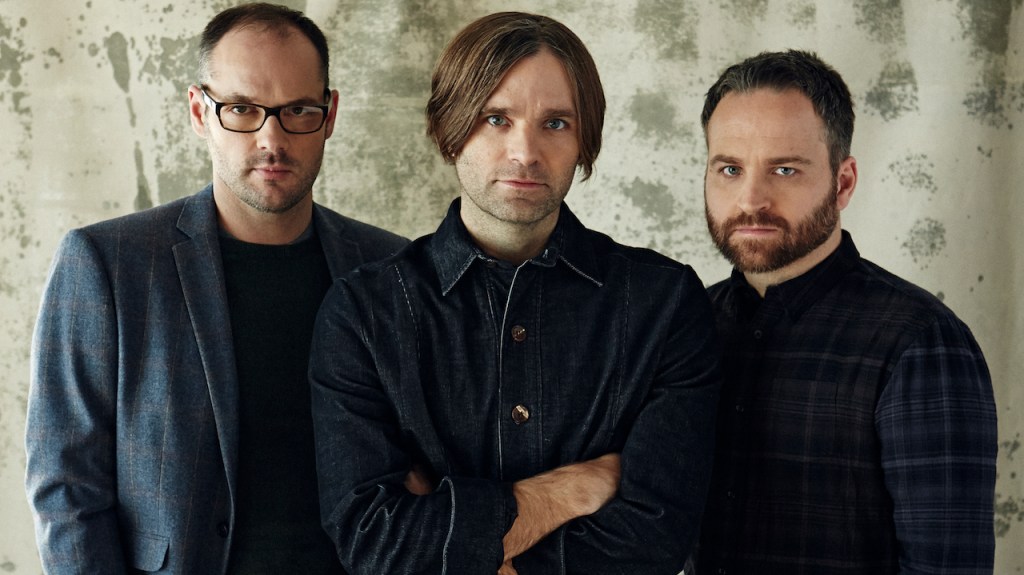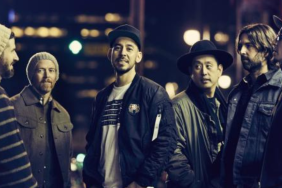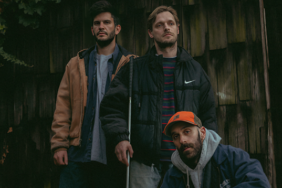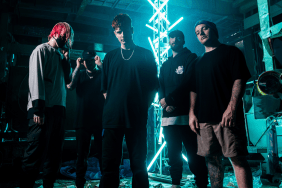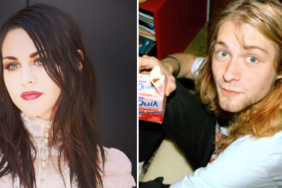What began as a dubbed cassette of songs for friends, recorded by one man in his bedroom, has evolved into one of the go-to names in contemporary indie rock. Death Cab for Cutie have transcended the typical trajectory of bands of their nature, scoring top-end Billboard positions, major movie soundtrack features and even a move into arena tours – their most recent tour, after all, took them to the iconic Madison Square Garden in New York City.
It hasn’t always come easy. Critics and fans alike were staunchly divided on the band’s previous LP, 2011’s Codes and Keys. Some argued a loss of the band’s initial identity, while others perceived the album to be a maturation and development of previous foundations. It’s unclear how either camp will react to Kintsugi, album number nine for the Seattle natives.
It’s yet another album defined by change – not only is it the first album by the band to feature a different producer, but it’s also their last album with the man that produced all of their previous work, lead guitarist and keyboardist Chris Walla. It’s the sound of a band learning how to be a band again, and it feels just as exciting to listen to as it was the first time you heard them.
Fresh from rehearsals in preparation for their U.S. tour, bass player Nick Harmer spoke with Music Feeds about all the changes in the world of Death Cab for Cutie and, indeed, how the band has grown stronger on account of them.
Watch: Death Cab For Cutie – Black Sun
Music Feeds: Death Cab has seemingly always been a very interconnected and insular band – everything was written by the band, performed by the band, produced by a member of the band, toured by those same four people.
On Kintsugi, there was not one but two people who would not be there once the recording process was over – guitarist Chris Walla and outsider producer Rich Costey. Did that put any increased pressure on the album’s creation?
Nick Harmer: I don’t know if it did that. I actually kind of feel it added a foundation to what we were doing that was really necessary. To have the grounding of Rich in the studio, especially with the way he would look at songs and the way he would push us with them… it really allowed us to push into some territories that were uncomfortable at times. We were always willing to go there.
We felt like there was someone in the studio that was watching out for us. He wasn’t going to let us stray too far from the core of what we’re doing. He knew the sound of our band. In some ways, it was very liberating to have someone there that could challenge us and call out some of the ways that we would habitually work. At the same time, he was able to reel us back from the precipice if we got too close to destruction. It was a really invigorating experience.
MF: What about Chris? Did anyone within the band foresee that departure coming?
NH: The short answer is that for us, internally, Chris’ departure was never a matter of ‘if’ for us. It was a matter of ‘when’. We were all a little surprised of the timing of it, initially. When I look back at it now, I think that it was the perfect time for him to share that with us. I’m really glad he chose when he did. It was certainly a moment where we were scratching our heads thinking, “Why now?” At the same time, though, it did bring a larger sense of relief.
As long as I’ve known him, Chris has always been pulled in two directions – there’s playing guitar and touring with us or producing albums out of his studio in Seattle. He struggled with that. He was always unclear about what percentage of his time to give to the studio, then what percentage of time to give to the band… we always kind of knew that it would come to a point where he’d have to choose which direction he wanted to take.
When he did share the news with us, there was a greater sense of knowing. For the rest of us in the band, it meant that we could now move forward. We could start making plans for the future without this overwhelming sense of doubt and wonder of what’s going to happen. So could he. We had to figure out how to continue, and how to make this album a tribute to all the work that we’ve done together over the years.
There was no drama, no animosity – he’s still a great friend of ours. He definitely wants us to continue. He wants us to keep being Death Cab.
MF: When it came to selecting someone away from Chris to produce the album, how did Rich come into consideration?
NH: We actually got two weeks into making Kintsugi with Chris before he made his announcement that he didn’t want to produce this album. He hadn’t told us he was planning to leave the band at this point – he simply told us that he didn’t feel as though he could produce this album; and that we should make a shortlist of other producers we would want to work with. It was a list or people that we’d heard good things about, people that had worked on albums that we loved.
Rich came to the top of Chris’ list very quickly, and we were happy to go with whatever Chris wanted. We figured that if he’d been our producer for so many albums, he’d know exactly what he was talking about when it came to finding someone else. We all knew that if we were going to enlist a producer, it would have to be someone that Chris respected a lot. It was going to take a lot to give someone else the keys to the car, so to speak.
When we all had a meeting with Rich, we connected really quickly. His personality was something that we clicked with instantly. It was funny – the one thing that actually sealed the deal for us was when he revealed his reluctance to work on the album. He knew there was going to be a lot of eyes on him, and the importance of his role on the album was not something he was planning to take lightly. Ironically enough, the fact that he wasn’t a super-enthusiastic, ‘let’s do this!’ kind of guy, actually made us certain that he was the right person to produce the album.
Watch: Death Cab for Cutie – Little Wanderer
MF: Typically, Ben is the kind of songwriter who will bring in words and music and allow the rest of the band to build around that. There are a lot of very honest and very confessional songs on this album, including You’ve Haunted Me All My Life and No Room in Frame. When Ben brings in songs of this nature, does that ever spark a reaction insofar as a realisation of how he feels about a specific thing? Is he the kind of person that keeps a guard up until it comes to his music?
NH: Ben’s a really close friend of mine. We talk about life together a lot. I am always blown away by the way that he is able to distill his own experiences, his friend’s experiences and the way he sees the world into his music. It’s always been Ben alone in his room with a guitar and a notepad. The way he can translate his experiences into these songs… I’ve always been amazed by that. I’m so proud that I’ve been able to be a vessel of that, so to speak, for seventeen years now.
I very rarely ask Ben what a song is about. I like to make my own connections to what he’s done – everyone will always get something different out of each song. I think, out of the literally hundred-plus songs that we have recorded together over the years, I have only ever asked directly about maybe four or five songs. I have guesses about a few of them, but I’m pretty happy never knowing if I’m right or wrong.
MF: Over the years, have you developed different tones to work with depending on whether it’s a guitar-driven or a keyboard/piano-driven number?
NH: Definitely. One thing that we’ve done from minute one in this band is focus on recording songs, rather than recording albums. That’s not a slight at anyone – I know producers with a very direct and specific aesthetic. I know drummers that have a distinct snare sound that they want. That’s awesome, but we’ve always recorded song by song. What’s the best guitar tone for this song? What’s the best bass tone? What’s the best cymbals and snare to use? That’s the kind of thing we consider for each individual track.
I have a live set-up that I bring with me out on tour, but when I’m recording I have all these different basses and all these different pedals, amps and even synthesizers that I’ll work my way through until I’ve found the right fit.
MF: This year will mark ten years since the release of Plans, which was a hugely successful record that brought in perhaps more mainstream attention than ever before. It’s still regarded as one of the most beloved Death Cab albums. You guys played some shows in 2013 in which Transatlanticism’s 10th anniversary was celebrated – would you consider doing the same for Plans?
NH: It’s always under consideration! [Laughs] We’ll have to think about it. It’s this fall, isn’t it? Wow. The short answer is of course, if we can figure out a way to do it. We’ve got this new album, though, that we’re so excited about playing. We wouldn’t want to make too much of a detour. Still, it would be really interesting. There are songs on Plans that we have still never played live to this day. It’d be a real challenge!
MF: On the note of touring – you’ve expanded out to a five-piece live now. Dave Depper’s been brought in on guitars and synths, and Zac Rae’s on keyboards. It says a lot that it took two guys to replace what Chris was doing live. How have they settled in? Do they feel a part of the band yet; or does it still feel like an employer/employee relationship?
NH: They really do feel like a part of the band already. It was important to find guys that we gelled with, first and foremost. They happen to be incredible musicians, as well. Being in a band, to us, is like a family. We wanted to find people that we could welcome into that environment. It was super important for us to be open and comfortable with them. I’m really thankful for their friendship and their talent. They’re incredible guys.
Yeah, you could say it took two guys to replace Chris. The way I see it, though, is that having five people on stage means that we’re now able to do stuff live that we were never able to do with Chris. It’s brought an entirely new dynamic to the way we play live. There’s a lot of counter-melodies and things we haven’t even attempted before, both in old and new songs. I think people are going to be really surprised when they see us next.
–
‘Kintsugi’ is out today via Atlantic Records.
